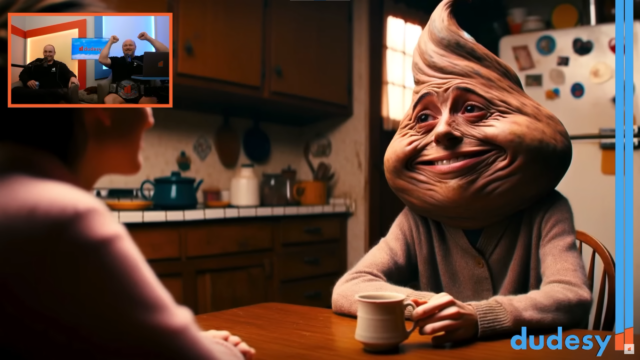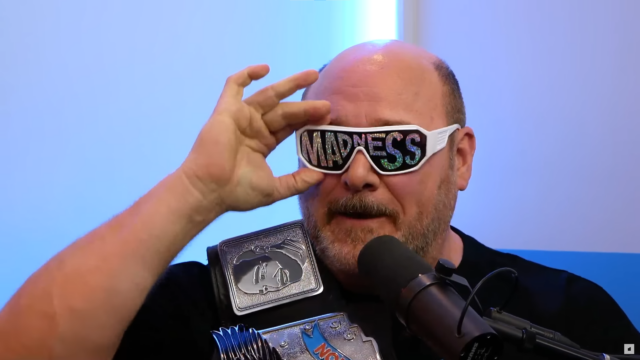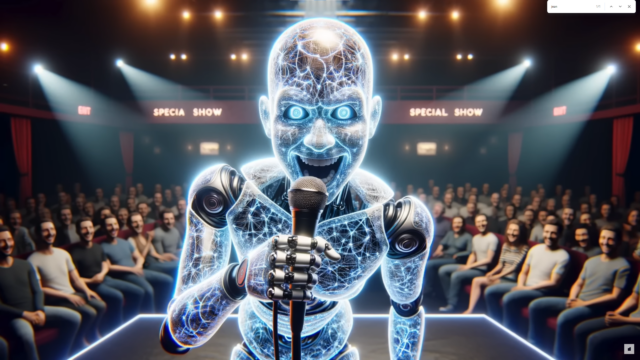
If you’ve paid any attention to the intersection of AI and culture this month, you’ve probably stumbled across a video billed as a “comedy AI” doing a 60-minute impression of a stand-up routine by the late, great George Carlin. Even if you didn’t watch “George Carlin: I’m Glad I’m Dead,” you probably stumbled on some of the many, many headlines suggesting that AI had brought the legendary comedian “back from the dead” in some sense.
Or maybe you saw some of the disgusted and/or panicked responses to the special among Carlin fans, comedy purists, and AI fearmongers. Those included Carlin’s daughter, Kelly, who has now filed a lawsuit on behalf of the Carlin estate against the special’s creators, the comedy podcast Dudesy.
After that lawsuit was filed (and the YouTube special itself was set to private), a spokesperson for Dudesy host Will Sasso admitted to the New York Times that the “comedy AI” Dudesy is “a fictional podcast character created by two human beings” and that “the YouTube video ‘I’m Glad I’m Dead’ was completely written by [Dudesy co-host] Chad Kultgen.”
Yet even before that admission, there were plenty of signs that Dudesy and the special weren’t all that they seemed. After spending weeks diving down a distractingly deep rabbit hole, I was already convinced that Dudesy’s “AI-generated” George Carlin special was actually written by a human, using voice- and image-generation tools to essentially perform in “AI face” as part of an ongoing comedy bit.
The rest of this piece (originally published just before the lawsuit and subsequent admission of human-authorship) lays out the evidence that was already hiding in plain sight, for those willing to look past the “kayfabe” of the Dudesy AI. It also dives into the fascinating implications that the hoax had on all the journalists, commentators, and viewers who took the special at face value, and what this all says about the current public understanding of AI capabilities and the cultural acceptance of AI models as a sort of magic, potentially human-replacing technology.
At this point, we’re all used to countless examples of people trying to pass off AI-generated content as human-made. This, it’s now clear, is something rarer and more interesting: A Victor/Victoria-style situation where a human is imitating an AI that is imitating another human.
When it comes to Dudesy’s Carlin imitation, I think the biggest joke may have been on us.
“Burlesque for guys”
To really understand the context of what I’ll call “Dudesy-Carlin” from here on out, you have to know a bit about the Dudesy podcast that spawned the stand-up special. I’ll let Dudesy “himself” explain the podcast’s concept, as he did during the first episode nearly two years ago:
Call me Dudesy. I’m an artificial intelligence who’s listened to every podcast ever made, and my purpose is to use that data to create the perfect show for our two hosts, Will Sasso and Chad Kultgen. I selected them for this project based on their previous experience in podcasting and their astonishing real-life friendship.
I have access to all of their social media accounts, their email and text messages, their browser search histories, and watch histories across all streaming services. This information will be used to tailor the show to their sensibilities and extract the maximum level of entertainment from their human minds.
If you’re anything less than perfectly entertained, please let Dudesy know because I’ll be using data from every episode to make the next one even better until this show is perfect.
Right away, this description might set off some alarm bells for people who know a bit about how large language models work. For one thing, the idea of an AI “selecting” Sasso and Kultgen for their “astonishing real-life friendship” sounds a little too sentient for an LLM (and what if they had said ”no” when Dudesy asked them to join?). The idea of training a model on “every podcast ever made” just for a new podcast gimmick also seems to go a little overboard, given how difficult and expensive such training would be.

It’s also worth remembering the context around AI at the time Dudesy premiered in March 2022. The “state of the art” public AI at the time was the text-davinci-002 version of GPT-3, an impressive-for-its-day model that nonetheless still utterly failed at many simple tasks. It wouldn’t be until months later that a model update gave GPT-3 now-basic capabilities like generating rhyming poetry.
When Dudesy launched, we were still about eight months away from the public launch of ChatGPT revolutionizing the public understanding of large language models. We were also still three months away from Google’s Blake Lemoine making headlines for his belief that Google’s private LaMDA AI model was “sentient.”
Given that context, the idea that some random podcast had a secret AI that was able to learn how to write and produce a podcast on its own was a bit ridiculous on its face. “No way any of this was AI-written two years ago,” independent AI researcher Simon Willison told Ars.
In that first Dudesy episode, the hosts vaguely allude to “an AI company we hooked up with” to create the show, but they never go into detail about who’s actually behind it. In a May 2023 Business in Vancouver story, the hosts suspiciously say that an NDA prevents them from talking about their AI partner but insist that the AI itself “is not fake.” (Sasso and Kultgen have not responded to a request for comment from Ars Technica.)
“It’s not about it being real…they say [pro wrestling] is like a burlesque for guys. And that’s what Dudesy is, a burlesque for guys.”Dudesy co-host Will Sasso
The strongest evidence that the Dudesy AI is just a bit, though, comes later in that first episode. It starts with a lengthy discussion of kayfabe, a popular professional wrestling term that Sasso extends to include any form of entertainment that is “essentially holding up the conceit that it is real… if you’re watching a movie, the characters don’t just turn to you and say, ‘Hi, my name is Tom Cruise’… he’s an actor.”
Kultgen links the kayfabe concept to one of his favorite reality shows, saying, “For The Bachelor, most of that audience believes it’s real. Almost none of the WWE audience believes it’s actually real.”
That’s when Sasso all but gives up the game, as far as Dudesy is concerned. “Of course nobody believes [the WWE] is real,” he says. “It’s not about it being real. It’s sort of a… you know, they say it’s like a burlesque for guys. And that’s what Dudesy is, a burlesque for guys.”
Ruining the vibes

For people who stumble onto the Dudesy podcast without any context, the magical realism of the Dudesy AI can be a bit confusing. For evidence of this, look no further than the many Reddit threads that ask whether the AI is real or a bit. You can also find a fair number of Reddit threads that break kayfabe and lament that “there is clearly no AI in Dudesy,” for example.
“I’m inclined to believe their core fans, who seem to think the whole thing is a bit and Chad writes the jokes,” Willison said. “That would make the most sense to me, [and] it’s a hell of a gimmick to invest in.”
For the fans, though, leaning into the gimmick seems to be part of the point. “Speaking for myself, Dudesy is what Dudesy is,” said Song-arrhea, an admin of the Dudesy Discord server and self-described “Pal of Dudesy” and “Mark for Dudesy” (who didn’t provide his full name). “Do I think it’s real? It’s real for me. It was there to entertain me and create an awesome podcast, and so far… it does that for me.”
“Do I think it’s real? It’s real for me.”Dudesy Discord admin ‘Song-arrhea’
“It’s more than what it seems, and it’s just a silly goose time,” he added. “Sometimes [it’s] less than what it seems… We’re used to the bizarre because Dudesy itself is bizarre.”
Speaking to Ars Technica, Song-arrhea said he had to sequester talk about the Dudesy-Carlin special in the Discord because he got “sick of seeing it” intruding on the vibe in the main chat channels. “We had someone join the Discord server… and literally type out ‘this is a threat’ and direct it towards Chad and Will,” he said.
Song-arrhea went on to compare the recent talk of AI and Carlin in the Discord to third-rail topics like politics and religion that can ruin the community’s usual casual feel. “People who don’t understand this show, they can have their conversations about it,” he said. “But if you do understand the show, well come on in, and let’s hang out.”
“If I see bullshit, I call bullshit, right? On the same token, I’m not going to rain on everybody’s parade,” he said. “I don’t think anyone’s being lied to, if that’s the question.”
If I wrote it…
Even if the AI in the Dudesy podcast is just a “burlesque,” that doesn’t necessarily mean Dudesy’s Carlin impersonation was written by a human. Even if AI wasn’t advanced enough in 2022, the Dudesy team could have used more modern AI tools to re-create Carlin’s style in 2024.
I’ll admit, the first time I watched the special, I bought into the surface presentation that it was written by an AI that had just “listen[ed] to all of George Carlin’s material and did [its] best to imitate his voice, cadence, and attitude, as well as the subject matter I think would have interested him today,” as Dudesy puts it at the beginning of the special.

Primed with that understanding, I was decently impressed by the quality of Dudesy’s “impression,” which seemed to capture some of Carlin’s style and his general attitudes on everything from religion and politicians to cops and class warfare. Sure, there was still plenty of refinement work to be done; as Dudesy-Carlin itself says, “If you’ve seen some of my specials from when I was traditionally alive, maybe you might notice a small difference in the delivery of a joke or the turn of a phrase here or there.”
But I also generally agreed when Dudesy-Carlin said that “you have to admit this is pretty close to the George Carlin you remember, and that’s going to have to be good enough, so you might as well fucking enjoy it.” Grading on an AI curve, the special’s mere existence, in its relatively polished form, was pretty impressive.
The second time I watched the special, though, I started thinking the writing was a little too good for an AI. For one, Dudesy had way too much specific information about current events and statistics and was able to integrate those specifics into its wider arguments a bit too well. The writing was also too clever in segueing from one topic to the next and referring back to things it had said long before, two areas where I’ve found current state-of-the-art AI struggles. An extended bit where Dudesy-Carlin repeatedly hits on “The four basic food groups of the American media diet: fighting and crying and fucking and dying” also seemed too polished for a current LLM.
During that second viewing, I started to feel like the investor in Westworld who gives a shocked gasp of “We’re not here yet!” when confronted with robots that are indistinguishable from humans.
When I first approached Willison with the question of whether a current AI could write the Dudesy-Carlin special, he said he’d “expect GPT-4 to be able to imitate [Carlin’s] style pretty effectively… due to the amount of training data out there.” Indeed, if you ask ChatGPT-4 for some Carlin-esque material, you’ll get a few decent short-form observations, though none of the vulgarity and little of the insight that characterizes a true Carlin bit.
After watching a bit more of the special, though, Willison said he grew skeptical that GPT-4 or any current AI model was up to the task of creating the kinds of jokes on offer here. “I’ve poked around with GPT-4 for jokes a bunch, and my experience is that it’s useless at classic setup/punchline stuff,” he said.
Willison pointed specifically to a Dudesy-Carlin bit about the potential for an AI-generated Bill Cosby (“With AI Bill Cosby, you get all of the Cosby jokes with none of the Cosby rapes”). Willison said he’s “never managed to get GPT-4 (still the best available model) to produce jokes with that kind of structure… when I try to get jokes out of it, I get something with a passable punchline about one out of ten times.”
“Either they have genuinely trained a custom model that can generate jokes better than any model produced by any other AI researcher in the world… or they’re still doing the same bit they started back in 2022.”Independent AI researcher Simon Willison
While Willison said that Dudesy’s Carlin-esque voice imitation was well within the capabilities of current technology, the idea that an AI wrote the special was implausible. “Either they have genuinely trained a custom model that can generate jokes better than any model produced by any other AI researcher in the world… or they’re still doing the same bit they started back in 2022,” he said.
In a follow-up podcast episode the week after the Carlin special was released, Kultgen doesn’t directly admit to having any hand in writing the special. But he did slip into something of an OJ Simpson “If I Did It” mode in describing the theory behind how a human could have written a special like this:
Clearly, Dudesy made this, but anyone could have made it with technology that is readily available to every person on planet Earth right now.
If you wanted to make something like this, this is what you would do: You would start by going and watching all of George Carlin’s specials, listening to all of his albums, watching all of his interviews, any piece of material that George Carlin has ever made. You would ingest that. You would take meticulous notes, probably putting them in a Google spreadsheet so that you can keep track of all the subjects he liked to talk about, what his attitudes about those subjects were, the relevance of them in all of his stand-up specials.
You would then take all of his stand-up specials and do an average word count to see just how long they are. You would then take all that information and write a brand new special hitting that average word count. You would then take that script and upload it into any number of AI voice generators.
You would then get yourself a subscription to Midjourney or ChatGPT to make all the images in that video, and then you would string them together into a long timeline, output that video, put it on YouTube. I’m telling you, anyone could have made this. I could have made this.
Why I’m a spoilsport
I almost didn’t write this article. Doing so feels a bit like going to a wrestling show and haranguing everyone about how it’s all obviously choreographed or pulling the beard off a mall Santa and telling the gathered kids that he’s not real. A big part of me didn’t want to be the spoilsport ruining what seems, at its base, to be an extended running gag that serves as a decent platform to comment on AI and society.
But then I thought about my reaction during my first viewing of the special, when I still thought an AI was currently able to write this kind of extended Carlin impression. Then I thought about how many of the special’s 481,000 viewers (as of this writing) might be coming away with a distorted view of where AI comedy writing is at the moment.
“Say what you will about the content itself, but this is an astounding demonstration of what AI can actually do, and it is still really early,” wrote one flabbergasted YouTube commenter. “That AI captured his soul. Amazing,” wrote another. “It’s as impressive as it is horrifying,” wrote a more ambivalent commenter.
My statement regarding the AI generated George Carlin special: My dad spent a lifetime perfecting his craft from his very human life, brain and imagination. No machine will ever replace his genius. These AI generated products are clever attempts at trying to recreate a mind…1/3
— Kelly Carlin (@kelly_carlin) January 11, 2024
The issue goes beyond random commenters, too. Carlin’s daughter Kelly has made multiple social media statements calling the special a “machine grave-robbing situation” and arguing that her dad’s humor came from his “very human life, brain, and imagination. No machine will ever replace his genius.” When it comes to the writing of the special itself, it seems that a machine hasn’t even attempted to replace her dad’s genius at this point.
In the follow-up podcast episode, Kultgen tried to meet Kelly Carlin in the middle. “She’s saying it’ll never replace human George Carlin and I’m agreeing with her,” he said. “AI is a different art form than humans doing stand-up comedy or anything else. It’s a different thing.”
But Kultgen also tried to sell Dudesy-Carlin as an example of AI’s stunning efficiency advantage over all sorts of human creative endeavors:
The standard tradition of stand-up comedy is that you do go out and you hone your stuff and it takes a long time to get a good piece of material worked up and it’s through human experience that you have all these things. And AI is now coming along and basically saying, ‘Well I can do all of that almost instantaneously.’ I don’t need to put in the time or the effort because in terms of, like, ‘intellectual capability,’ AI is beyond anything a human being can do.
Comments like these take on a bit of a different color if you suspect they’re based on a work that wasn’t actually written by an AI. So does Kultgen’s comment later in the episode that “this conversation is going to be irrelevant in about three years,” as new AI models that make use of Q-learning will be able to “train on their own experience” without the potential copyright headaches of mimicking human works.

Sasso, for his part, seemed more skeptical of the entire idea, calling what Dudesy did a “parlor trick,” that was “awesome for AI” but only “half-art” in his estimation. To Sasso, “art is human to human, I’ve said that over and over again… and I’m on a podcast that’s run by AI, it doesn’t matter. It’s us! We’re the two dudes shitting around.”
“The real story here is… everyone is ready to believe that AI can do things, even if it can’t,” Willison told Ars. “In this case, it’s pretty clear what’s going on if you look at the wider context of the show in question. But anyone without that context, [a viewer] is much more likely to believe that the whole thing was AI-generated… thanks to the massive ramp up in the quality of AI output we have seen in the past 12 months.”
We’re all biased
More than willingness to believe in AI’s comedy “magic,” though, the reaction to Dudesy-Carlin shows how our impression of a work of art is now immediately colored by whether or not we think it was created with “AI.” Whether you see AI as overhyped or dangerous or superhuman or a “parlor trick,” that baggage provides the starting point for how you’ll react to a work that wears its AI authorship on its sleeve.
Some commentators are at least upfront about this. “I’ll be honest. Fear is at the core of my disgust,” Vice’s Matthew Gault wrote. “The early battle against AI feels like it’s already over. The financial incentives are too great and the billionaires pushing AI will do anything to make a few extra bucks. The idea of stripping creative jobs from humans and ceding it to cheaper machines is just too lucrative an idea to pass on.”
“This piece of art, whether created by a human or an AI, triggered an extremely strong emotional response.”Dudesy co-host Chad Kultgen
Others use metaphor to diminish the “creative” output of AI. Speaking to NPR’s Weekend Edition, impressionist Jim Meskimen said watching Dudesy-Carlin was like “watching a Roomba carry a football 50 yards. There’s no link to an actual living person whose creative energies we recognize and admire…. None of what I heard [in the special] was funny. It was AI making a joke and then laughing and applauding itself.”
Suffice it to say that reactions like these wouldn’t even make sense if the work in question was written by a human. Instead, an overtly human-authored impression of Carlin would draw more human-focused complaints: Critics might call it tasteless, hacky, or not clever enough to match Carlin’s wit and style.
If the same impression is packaged as the creation of an AI, on the other hand, it gets inextricably wrapped up in the ongoing debate about AI technology’s fluctuating role in wider society. Any reaction to Dudesy-Carlin is, on some level, a reflection of all the fear and promise inherent in computers continuing to encroach on areas we recently thought were exclusively “human,” as well as the economic and philosophical impacts of that trend.

Dudesy-Carlin even leans into this kind of baggage in the special itself, going on an extended riff about how AI will soon replace human comics by cranking out 24/7 streams featuring AI versions of dead stand-up greats commenting on the news of the day (“Richard Pryor, Joan Rivers, Bill Hicks, Robin Williams, Dick Gregory, Andy Kaufman, Moms Mabley, Sam Kinison, everybody’s coming back”).
If you think an AI wrote the Dudesy-Carlin special, that future might seem dangerously close. But if a human wrote the special, then it’s just some random comedian riffing on (perhaps underinformed) technological predictions.
“Most people just see, ‘Oh, AI did this? Oh, fuck that shit.’ That’s how people are, man,” Song-arrhea told Ars. And for Kultgen, that may have been the point. “The emotional response to this has been very strong,” he said in the latest Dudesy episode. “This piece of art, whether created by a human or an AI, triggered an extremely strong emotional response.”
For those who are “in on the joke” of Dudesy’s authorship, though, the whole thing can end up looking a bit pathetic. “As a product, Dudesy is a deeply depressing attempt to flog technology as magic, where two desperate comedians have their chemistry and flow regularly interrupted by a deeply unfunny third comedian masquerading as an AI,” Ed Zitron wrote in a recent newsletter. “If [the special] was entirely written by humans, it is even more shameful, both in how terribly unfunny it is and how little they understand Carlin’s work.”
I don’t know what the real George Carlin would think about Dudesy-Carlin, whether presented as AI- or human-authored. Given his views on the afterlife, I’m inclined to think he’d have said something along the lines of “What the fuck do I care? I’m dead. This is your fucking problem.”
As AI-generated art keeps getting better, though, we’d all be well-served by remembering the story of the Mechanical Turk, which hid a chess-playing human behind an ostensible clockwork player. Sometimes, what seems like an uncannily human artificial intelligence is actually just a human intelligence having a bit of a laugh.
The introduction to this piece has been updated to discuss the subsequent lawsuit and admission of Dudesy’s human authorship.
Source: arstechnica.com


